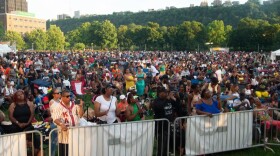In an empty classroom after lunch period, student organizers go over final details for an upcoming rally and march, including confirming speakers and collecting cash for T-shirt orders.
The group, Woodland Hills Students Against Gun Violence, formed after last month’s mass shooting at a high school in Parkland, Fla.
In addition to events at their school, some of the group's members are taking a bus to Washington D.C. Saturday to join the student-led “March For Our Lives,” organized in response to the Parkland shooting. Partner marches are planned across the country, including in Pittsburgh.
“Our legislators’ inability to change and to implement some kind of viable gun control directly impacts our future,” said 11th grader Ava Karas. “And just because I’m a couple months shy of voting doesn’t mean that we can’t have a voice, because we are being affected.”
Karas has been circulating a petition that she plans to send to elected officials. It calls for a ban on assault weapons, and increased safety measures like waiting periods, background checks and age requirements. Several hundred students have signed so far.
The national youth-led effort has inspired action from these students, who have been grappling with gun violence in their own community for years.
“It was a wakeup call,” said Karas.
Sophomore Rhiya Godhania-Carter said the actions of Parkland students were a jumping off point for their own activism.
“We saw it we realized, 'hey, this didn’t just happen to them, it happens to us all the time, it just didn’t happen on a larger scale like it did to them,'” she said.

While Godhania-Carter said she was proud to see other students declaring “enough,” she adds people shouldn’t only pay attention mass shootings, when gun violence happens every day in low-income and black neighborhoods.
The group recounts the names and dates of Woodland Hills students who have been shot, at least four fatally, in the last two years.
Last year, two Woodland Hills students were shot and killed over Thanksgiving break, including 16-year-old Jerame Turner.
“He was just walking home, and it really touched me because he was a life. He was going to be someone. It’s awful,” Karas said of Turner.
In 2016, Kennir Parr was killed at age 14. He was a bystander.
“He was really smart. He was in Algebra 2 in 8th grade with me,'" said Godhania-Carter. "The last couple messages I sent him were, ‘could you send me the algebra homework?’ It didn’t really hit me until I came back to school freshman year and he wasn’t in my math class.”
Keaura King said she thinks a lot of the problems are systemic – that many communities are underfunded, and without resources that could prevent violence. And for these young people, the impact of shootings go beyond losing friends and loved ones.
“For example, most kids play outside when they’re young,” said King. “My mother didn’t let me because we were afraid of gunshots, so I was an inside kid, and I feel like that affected me a lot.”
All the students in the school's anti-gun violence group said it’s impossible to talk about guns, without talking about race.
“In the media, it’s always shown that if it’s a white person that shoots somebody up, they have mental health issues, but if it’s a black person that shoots somebody up, it’s a gangster,” said Godhania-Carter.

They added that the whole conversation is further complicated by the issue of police brutality. Yes, guns in the U.S. are part of the problem, they said, but more guns can’t be a part of the solution - especially in the hands of teachers, but also in the hands of armed school resource officers – which Woodland Hills has, or, police officers.
The students said their proposed safety measures could help curb shootings in their schools and on their streets. Their nascent efforts have already raised almost $2,000 to send about 25 kids to D.C. for the national march. Hundreds of students participated in a walkout last week, and Friday, they organized a rally, with a variety of speakers and workshops.
The group said their work doesn’t end after the events of this weekend. They’re concerned about the energy fading – that people will stop caring about gun violence until the next mass shooting.
But Keaura King has faith in her peers.
“Our generation is the generation of change. We advocate for what we want and this will be no different,” she said.




